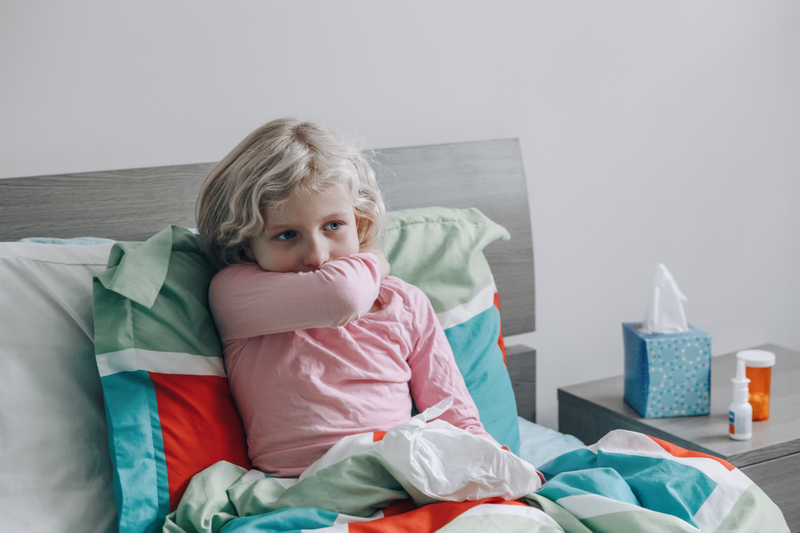Not only is coughing miserable, it can prevent a child from being able to sleep or attend school or other activities. Additionally, coughing is a primary way of spreading infections. Finally, while the majority of coughing is harmless and resolves on its own in a week or so, occasionally a cough is an indication of something more serious.
But, how to tell the difference? Here are some questions to answer to help you decide if your coughing child needs something more than symptomatic treatment and time.

What Type of Cough Does Your Child Have?
In general, coughs can be divided into three categories.
- Dry Cough: By definition, a dry cough does not produce any sputum (phlegm). This type of cough usually originates from the upper airway/throat. Common reasons for dry cough include seasonal allergies with post-nasal drip, a sore throat caused by a virus such as croup (laryngitis), and in rare cases by habit. Usually, a dry cough does not require specific treatment and will resolve on its own. It can be distinguished from the other types by its lack of sputum and by the lack of rattling sound during a cough.
- Wet Cough (productive cough): By definition, wet coughs are productive of sputum (phlegm). This type of cough usually arises from deeper in the airway such as the bronchi and is typical of bronchitis. Wet coughs are usually the result of viral respiratory infections and usually resolve on their own. It can be distinguished from the other types by its production of sputum and by the “rattling” sound during a cough.
- Bronchospasm cough (asthma cough or variant asthma): This type of cough is most common in asthmatics or those with COPD/emphysema. It is the result of narrowing of the lower airways due to inflammation and swelling. While the inflammation can be started by an infection, bronchospasm coughs often occur when a person has an asthma or COPD flare independent of an infection. This type can be distinguished by the presence of wheezing, a tickling feeling in the lungs or a coughing sound that is prolonged and tails off at the end.
Are There Any Other Symptoms?
Just because your child is coughing they do not necessarily require evaluation or treatment since most coughs will resolve on their own. However, certain symptoms occurring with a cough should cause concern and prompt evaluation. Some examples include:
- If your child is coughing continuously before taking a deep, “whooping” inhale, this could be a sign of “whooping cough” (pertussis) which remains in our community at low levels, especially among those not fully vaccinated. Your child should see a doctor immediately.
- If your child is coughing up blood, this could be a sign of trauma to the airway or a serious infection. Your child should see a doctor in this situation as well.
- If your child coughs in rapid succession before vomiting, you may need to treat the cough to prevent vomiting. You might also want to call your doctor if this continues.
- Most coughing in kids that is serious will be accompanied by a fever — so if your child’s temperature never exceeds 100.4, you can be somewhat reassured. However, not all coughing and fever is worrisome, therefore, watch for other signs listed here to help you decide if it’s time to see a doctor.
- If your child appears to be having difficulty breathing at any time, or has limited activity due to inability to breathe, especially in the setting of a cough, they should be evaluated by a doctor.
- Chest Pain is always a cause for concern, especially when combined with coughing. Most commonly the pain is coming from strain of the chest wall muscles caused by the cough, but it can be a sign of a serious infection, collapsed lung, or other serious issues. This should prompt seeing a doctor.
Should You Give Medications to Your Child?
Coughing can be frustrating for everyone in the family and we all want to do something to stop it. Unfortunately, there aren’t many over-the-counter remedies that are effective at controlling coughing. These are the few things that are safe and have been proven to help:
- Vaporizer machine: These are available at any drug store and produce a visible vapor (as opposed to a humidifier that just moistens the air) that when inhaled, soothes the airway to reduce dry coughs and loosen sputum to reduce productive coughs. This is particularly useful next to the bed at night and for dry coughs and croup.
- Cough lozenges: These come in two types. One is essentially just candy but can help by producing saliva that moistens the throat. The other type contains a mild anesthetic, usually menthol, that helps to numb the irritated airway. These only really help dry coughing. Note: you should not allow your child to fall asleep with a lozenge in their mouth as they might inhale it.
- Honey: Yes, simply taking a spoonful of honey is effective at reducing coughing. In clinical trials, doing so was more effective for children than several over-the-counter cough medications!
- Bronchodilators (inhalers): for bronchospasm coughs, medications like albuterol (usually inhaled) can relax the inflamed, narrowed airways and reduce coughing. These medications are only available by prescription, but they can reduce coughing caused by constricted airways.
- Prescription cough medications: while these are effective, they usually contain medications that can be addictive or have significant side effects. Therefore, they are usually reserved for more serious cases.
Unfortunately, none of the over-the-counter “cough medications” like Delsym, Robitussin, or Mucinex have been shown to be effective at treating cough in children in most situations. Before starting any of these medications in your child you should consult a doctor.
Should You See A Doctor?
As mentioned above, most coughing in children is benign and resolves on its own. But, if they have any of the worrisome symptoms listed above or if the cough persists beyond 2 weeks, it’s probably time to see a doctor.

